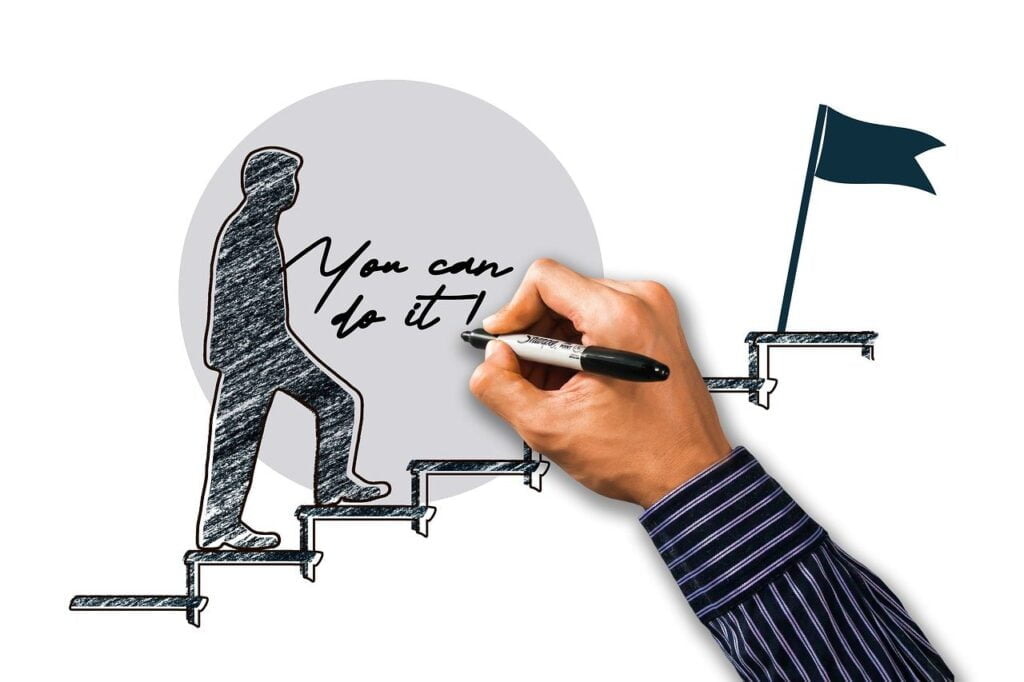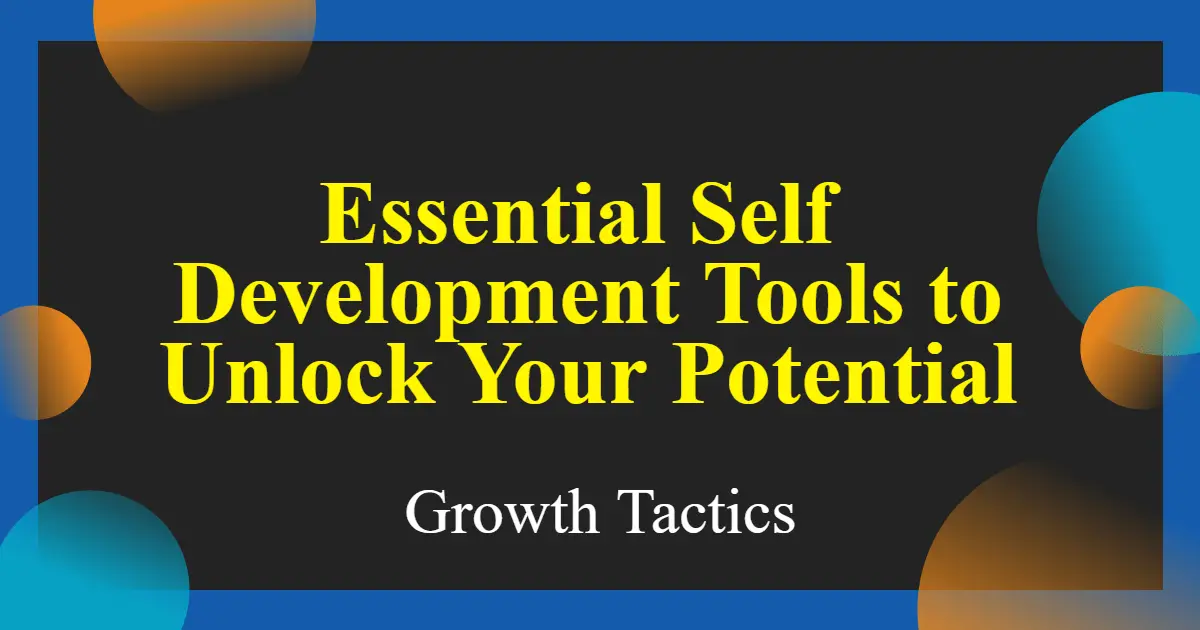Self-development is the process of improving yourself through active participation in learning, self-reflection, and personal growth. It involves intentionally developing skills, expanding knowledge, and cultivating positive habits to reach your full potential personally and professionally. Self-development is a lifelong journey that requires commitment, self-awareness, and a growth mindset.
When we actively work on self-development, we become more effective, productive, and able to achieve our goals. It helps us identify our strengths and weaknesses allowing us to build on our talents and address areas for improvement. Whether reading personal development books, taking an online course, attending seminars, or seeking mentoring, self-development exposes us to new ideas and perspectives. This expands our thinking and equips us with strategies and tools to unlock our capabilities.
Some essential self development tools unlock your potential including self-reflection, goal setting, time management, learning, building habits, self-care, relationships, and skills development. This article will explore practical tips and best practices for these core personal growth and self-improvement areas. With focused effort and the right approach, self-development can help you become the best version of yourself and live a fulfilling life aligned with your values and purpose.
Identifying Areas for Improvement in Your Personal and Professional Life

Improving yourself is a broad endeavor that should cover personal and professional aspects of your life. It’s essential to identify areas for improvement consistently to evolve and become the best version of yourself. This pursuit of betterment is a lifelong personal development journey that requires dedication and introspection.
Personal Development: Reflect and Set Goals
To begin the process of personal growth, reflect on your current state and the various areas of your life. Consider your overall well-being, including mental health, stress levels, and work-life balance. Ask yourself if there are any aspects where you feel unfulfilled or if there might be new skills you want to develop.
One effective way to structure this reflection is by setting goals. Perhaps you’d like to improve your health and relationships, or maybe it’s to learn a new language.
Professional Development: Evaluate and Develop New Skills
In your professional life, identifying areas for improvement can lead to new career prospects and enhanced job satisfaction. Take stock of your current skill set and consider where you might benefit from professional development. This might include learning new technologies, adopting leadership qualities, or improving communication skills.
Look closely at your daily routine. Are there ways you can incorporate learning and growth into your schedule? Even small, actionable steps like dedicating 30 minutes a day to a new language or professional course can bring about significant change over time.
Learn and Grow: Embrace the Journey
Once you have identified key areas for improvement, create a plan to develop new skills. This will likely involve stepping out of your comfort zone and embracing challenges as opportunities to learn and grow. Incorporate these changes into your daily routine to make them stick.
Remember that learning is a cumulative process — regular practice, whether learning a new language or a professional skill, leads to mastery. Stay open and flexible to adapt your strategies as needed, and always seek feedback to guide your progress.
Actionable Steps: Move Forward with Purpose
Identifying where you need to improve is just the first step. Taking action to work on those areas will ultimately lead to your growth. Schedule regular check-ins with yourself to assess your progress and re-align your goals as necessary. Remember that personal and professional development is not a race, but a marathon with unique milestones for each individual.
Self-Reflection

Self-reflection is a powerful tool for personal growth. It involves looking inward and gaining a deeper understanding of yourself, your strengths, weaknesses, values, goals, and areas for improvement. Self-reflection can be facilitated through practices like journaling, meditation, and mindfulness.
Journaling is one of the best ways to engage in self-reflection. Keeping a journal allows you to record your thoughts, feelings, experiences, and growth over time. Writing helps you process emotions, gain clarity, and identify patterns or areas needing change. Maintaining a journal supports self-awareness and reflection.
Meditation and mindfulness are about being fully present and aware of your thoughts, emotions, and sensations in the moment. Daily meditation helps calm the mind, relieve stress, and provide mental clarity. Mindfulness involves paying attention to the present non-judgmentally. These practices teach self-awareness, self-regulation, and acceptance.
Identifying your strengths and weaknesses through self-assessment and reflection is key for development. Knowing your strengths allows you to build on them. Recognizing weaknesses helps you address areas for improvement. Examining your core values helps align your life and goals to what matters most. Self-knowledge lays the foundation for positive change.
Goal Setting
Setting clear goals is essential for personal development and growth. Goals provide direction and focus as you work to improve yourself. However, not all goals are created equal. The most effective goals follow the SMART framework – Specific, Measurable, Achievable, Relevant, and Time-Bound.
For example, “I want to exercise more” is vague. A SMART goal would be “I will walk for 30 minutes, 5 days per week for the next 3 months.” This goal is specific, measurable, achievable, relevant to your health, and time-bound.
Creating a vision board can help clarify your goals. Compile images and words representing your ideal future. This visualization activates your subconscious and motivates you as you work towards your goals.
To stay on track, build habits and systems that support your goals. Using a journal, calendar, or app to record progress provides accountability. Share your goals with a trusted friend or mentor. Their encouragement can inspire you to persist when challenges arise.
Review your goals regularly and adjust as needed. Celebrate small wins along the way. The sense of progress will give you the energy to continue your personal growth journey.
Time Management
Time management is an essential tool for unlocking your potential. It involves prioritizing your most important tasks, scheduling time to complete them, and eliminating distractions.
To improve your time management:
- Make a daily to-do list each morning. Prioritize the 3-5 most important tasks. Focus on completing them before moving to other activities.
- Use a calendar to schedule time for your priorities. Block off chunks of time dedicated to high-value tasks.
- Batch similar tasks together. For example, check emails and messages just 2-3 designated times per day.
- Eliminate distractions during focused work. Silence phone notifications, close extra browser tabs, and find a quiet space.
- Take breaks between intense periods of focus to recharge. Use the Pomodoro technique – 25 minutes of focused work followed by a 5-minute break.
- Delegate tasks when possible. Determine what can be reasonably handed off to others to free up your time.
- Review how you spend your time. Keep a log of your activities for a few days. Identify areas of wasted time that could be reduced.
Effective time management leads to greater productivity and control over your day. It helps ensure you’re spending time on the things that matter most to reaching your potential.
Learning – Reading, Online Courses, Seminars

Learning new skills and expanding your knowledge is essential in personal development. There are many ways to continue learning throughout your life.
Reading books on personal growth, your career or hobbies can introduce you to new ideas and perspectives. Reading just 30 minutes a day can make a big difference over time. Look for well-reviewed personal development books and find a genre you enjoy.
Online courses are a flexible way to gain new skills and learn from experts. Thousands of online courses on topics like technology, business, and personal development are available through platforms like Udemy, Coursera, and LinkedIn Learning. Take advantage of free courses or set aside funds for investing in your learning.
Seminars and workshops provide immersive learning experiences where you can focus on a topic and interact with others. Look for seminars near you on leadership, mindfulness, communication skills, or other relevant topics. Conferences related to your industry are also great for learning and networking. The energy of in-person events can boost motivation.
Make learning a lifelong habit. Look for ways to build your knowledge, for professional reasons and personal fulfillment. Learning new things exercises your mind, exposes you to new perspectives, and keeps life exciting.
Building Habits
Developing good habits and breaking bad ones is essential for personal growth. Start by identifying 1-2 small, achievable habits you want to build. These could be things like meditating for 10 minutes daily, reading 30 pages a day, or going for a 15-minute walk after dinner.
When starting a new habit, it’s important not to take on too much at once. Start small and focus on sticking with just that one new habit for 1-2 weeks until it becomes more automatic. Building new habits takes consistency over time.
Having an accountability partner can help motivate you to stay on track, especially during the early stages. Check-in with each other daily or weekly and celebrate successes together. Consider joining an online community or in-person group with others working towards similar habits.
Rewards are also great for establishing habits. After a week of consistent meditation, treat yourself to something special. Then set a new reward after 2 weeks, 4 weeks, etc. Use rewards to reinforce the behavior, but don’t rely on them long-term. Over time, the habit itself will become the reward.
The key is persistence. Don’t beat yourself up over slip-ups. Just start again the next day. Those small daily habits will gradually become part of your routine with regular practice.
Self-Care
Taking care of your physical, mental, and emotional health is crucial for unlocking your full potential. Self-care allows you to recharge, nurture yourself, and thrive in all areas of life.
Physical Health
Physical health impacts everything you do, so taking care of your body is essential. Eat nutritious foods, stay hydrated, exercise regularly, and get enough sleep. Consider joining a gym or taking fitness classes. Develop habits that support your physical well-being.
Mental Health
Boost your mental health by managing stress through meditation, yoga, or deep breathing. Keep your mind active and engaged by reading, writing, or learning new skills. Make time for hobbies you enjoy. Connect with others for stimulation and support. Seek professional help from a therapist if you are struggling with mental health issues.
Emotional Health
Pay attention to your emotions and process difficult feelings through journaling or talking to trusted friends. Do activities that make you feel happy and fulfilled. Be kind to yourself and practice self-compassion. Find ways to nurture your spirit through creativity, time in nature, or your religious/spiritual practices. Take steps to improve your emotional intelligence.
Making self-care a regular habit will give you the energy and resilience to pursue your goals and become the best version of yourself. Be patient and compassionate with yourself throughout the process.
Relationships
Developing strong relationships is an essential part of personal development. Surrounding yourself with mentors, peers, and a support system that encourages growth can help unlock your potential.
Find a Mentor
A mentor is a more experienced person who can provide guidance, feedback, and support. They can give advice based on their experiences to help you develop professionally and personally. Having someone to turn to for wisdom and accountability can be invaluable. Seek a mentor in your industry or a wise friend who embodies the qualities you want to cultivate.
Build Your Network
Networking connects you with people who can become collaborators, friends, mentors, clients, or colleagues. Attend industry events, conferences, and seminars to meet new people. Social media and online forums can also help you build connections in your field. Share knowledge and help others to develop mutually beneficial relationships.
Join a Support Group
Support groups provide a community and a safe space to share challenges, celebrate wins, and find encouragement. For example, joining a writing group could motivate you to keep working on your book. A group focused on health goals could inspire lifestyle changes. Surrounding yourself with others and working towards self-improvement can help you stay focused.
Skills Development
Developing key skills can be instrumental in unlocking your potential. Some important skills to consider developing include:
Public Speaking
Being an effective public speaker can open many doors professionally and allow you to articulate your ideas better. Consider joining a public speaking group like Toastmasters to practice speaking in front of others. Start small by presenting at team meetings or speaking up more in smaller group settings. Observe strong public speakers and analyze what makes them compelling. Improve your storytelling, vocal variety, eye contact, and body language. Prepare thoroughly for any speaking engagement. The more you put yourself out there, the more comfortable you will become as a presenter.
Critical Thinking
Sharpening your critical thinking abilities will allow you to analyze issues deeper, problem-solve more effectively, and evaluate information thoroughly. Reflect on your thought processes and identify any biases or flaws in your reasoning. Ask probing questions, examine issues from multiple angles, and don’t take things at face value. Seek out people who think differently than you and listen to their perspectives. Take logic or reasoning courses to strengthen your critical faculties. Approach problems with curiosity and creativity.
Creativity
Unlocking your creative potential can lead to innovation, unique solutions, and artistic expression. Try creative exercises like brainstorming, freewriting, or mind mapping to generate ideas. Take art classes, experiment with creative mediums, or learn an instrument. Immerse yourself in environments that inspire you, like museums or nature. Make time for unstructured play and improvisation. Collaborate with others who have different creative strengths. Set aside your inner critic and don’t censor yourself – let your imagination run wild. Practice thinking flexibly and making unexpected connections between ideas. The more you engage your creative side, the more it will flourish.
Conclusion
As we wrap up our exploration of essential self development tools, many powerful resources are available to help unlock your potential. The journey of personal growth and self-improvement is an ongoing process but can be incredibly rewarding.
The most important first step is self-reflection – taking time to identify your strengths, weaknesses, goals, and areas for growth. From there, tools like goal setting, time management, learning, habit building, and skills development can help you make steady progress. Don’t forget self-care either – nurturing your physical, mental, and emotional health is critical.
Building strong relationships and connecting with others also play a big role in personal development. Seeking out mentors, coaches, peers and communities aligned with your goals can provide inspiration, accountability, and support.
While the path won’t always be easy, staying focused on your purpose and meaning can help motivate you through challenges. With regular practice using the strategies outlined here, you can achieve your personal and professional goals and become the best version of yourself.
The time to start is now – choose one or two tools that resonate with you and begin putting them into action. Stay consistent and be patient with yourself. With the right approach, essential self development tools can unlock your potential and set you on the path to fulfillment.


